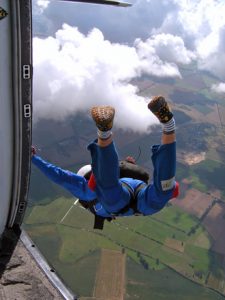Personal injury Lawyer Matt Arnold answers the question: “What should I do if I have been injured by another party but I can’t afford a lawyer?”
The legal battle against Colorado company Mile-High Skydiving has waged on to the state’s Court of Appeals, and the lawsuit might not involve quite what you expect.
 To the risk-averse and experienced skydiver alike, the litigious nature of the sport of skydiving probably comes as no surprise. The activity is fraught with injury, death and the lawsuits that sometimes follow. The United States Parachute Association (USPA) recorded 24 fatal skydiving accidents and 729 injuries in the United States in 2014, out of roughly 3.2 million jumps. Although user error can sometimes be to blame, the industry is also fraught with negligence lawsuits against companies providing the activity.
To the risk-averse and experienced skydiver alike, the litigious nature of the sport of skydiving probably comes as no surprise. The activity is fraught with injury, death and the lawsuits that sometimes follow. The United States Parachute Association (USPA) recorded 24 fatal skydiving accidents and 729 injuries in the United States in 2014, out of roughly 3.2 million jumps. Although user error can sometimes be to blame, the industry is also fraught with negligence lawsuits against companies providing the activity.
However, Mile-High Skydiving isn’t being sued for negligence or wrongful death. No, the company was brought to court in May of last year by a group calling themselves “Citizens for Quiet Skies,” as well as seven (7) other local residents, in the form of a noise complaint.
“What’s that?” you ask. “I can sue someone for being too noisy?” Noise complaints are a form of nuisance action in personal injury law. They can take the form of either a public nuisance or private nuisance complaint; public nuisance lawsuits are filed as criminal complaints as a matter of public policy. Actions for private nuisance, by contrast, are grounded in property law and are filed as personal injury actions in civil court. Examples of private nuisance that have succeeded in court before include cases where plaintiffs have proven that foul odors, dust, smoke, loud noises and excessive light attributable to another substantially interfered with their personal enjoyment of property.
The Citizens for Quiet Skies is composed of a group of citizens in the Longmont, Arizona community near the Boulder County Airport headed by local resident Kimberly Gibbs. The group sued Mile-High for violating each of their individual rights to use and enjoy their property. If found to have negligently, recklessly or intentionally unreasonably interfered with this property right, the company could be held liable.
This is because of the high esteem with which individual property rights are held in American law. A person’s right to use and enjoy their personal property, particularly real property (land and the buildings and other structures attached to it) as they see fit receives great deference under the law. Included in this right to lawfully enjoy your own land is the right to reasonable comfort and convenience on the land.
In this case, the Citizens for Quiet Skies alleged that High-Skies interfered with their right to enjoy their properties such that it constituted negligence, nuisance, trespass and unjust enrichment (the idea that one should not be allowed to profit at another’s expense without compensating them). The plaintiffs claimed Mile-High flies its planes loudly, frequently and besides being an audial annoyance, were depreciating the values of homes in their neighborhood.
The district judge dismissed the trespass and unjust enrichment claims straightaway last year. However, the other charges went to trial, in which both sides called noise, real estate and aviation experts as witnesses. After each side’s noise experts presented contradictory testimony, the judge ended the trial by visiting the plaintiff’s homes in person while Mile-High flew overhead so that she could experience the noise levels for herself.
The judge denied all the plaintiff’s claims. Now Kimberly Gibbs, the local resident heading the Citizens for Quiet Skies, has appealed the decision to the Colorado Court of Appeals. Gibbs has told the media she has been left financially “devastated” after legal costs from the initial lawsuit and believes the judge misapplied the law.
However the appellate court decides to rule, this is a good reminder that just because the right to enjoy your property is important in the eyes of the American law, there are also limits to this right.
If you or someone close to you has been injured, contact an experienced personal injury attorney today who can help you receive the compensation to which you may be entitled. Contact Arnold & Smith, PLLC for a free consultation, call at 704-370-2828 or click here for additional resources.
About the Author
 Matthew Arnold is a Managing Member of Arnold & Smith, PLLC, where he focuses on the areas of family law, divorce, child custody, child support, alimony and equitable distribution.
Matthew Arnold is a Managing Member of Arnold & Smith, PLLC, where he focuses on the areas of family law, divorce, child custody, child support, alimony and equitable distribution.
Mr. Arnold was raised in Charlotte, where he graduated from Providence Senior High School. He attended Belmont Abbey College, where he graduated cum laude, before attending law school at the University of North Carolina at Chapel Hill on a full academic scholarship.
A board-certified specialist in the practice of Family Law, Mr. Arnold is admitted to practice in all state courts in North Carolina, in the United States Federal Court for the Western District of North Carolina, in the North Carolina Court of Appeals and Supreme Court, and in the Fourth Circuit United States Court of Appeals in Richmond, Virginia.
In his free time, Mr. Arnold enjoys golfing and spending time with his wife and three children.
Source:
http://www.uspa.org/facts-faqs/safety
Image Credit:
http://www.freeimages.com/photo/exit-aircraft-5-1505296
See Our Related Video from our YouTube channel:
https://www.youtube.com/user/ArnoldSmithPLLC/videos
See Our Related Blog Posts:
 Charlotte Injury Lawyers Blog
Charlotte Injury Lawyers Blog


 How can I help you?
How can I help you?